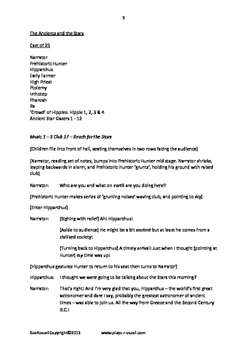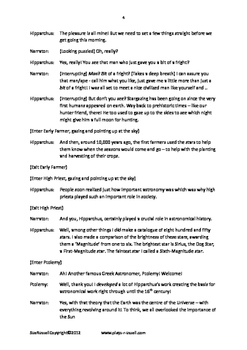Ancient, Stars and History of Astronomy Class Play
Susan Russell
393 Followers
Grade Levels
4th - 8th
Subjects
Resource Type
Formats Included
- PDF
Pages
11 pages
Susan Russell
393 Followers
Description
Ancients and the Stars Class Play
Written by Sue Russell
Cast of around 25, Duration around 10 - 20 minutes.
This class play on the history of astronomy and star gazing has a cast dating from prehistory to the present day! Quite a challenge (as always!) for our narrator! Most at ease with 'civilized' Ancients', there are still those tricky moments with tricky characters - like overly curious astrologers!
Lots of fun rock music as always to enhance this star cast performance!
This is the second of a series of scripts on Space, written as a set of 4, the others being A Brief History of Space, The Planets, and Stepping Back into Space: Past and Future. These can be bought separately and there is a Space Quiz (available separately) based on the scripts' content plus a few other 'fun facts'!
All available off TpT and www.plays-r-ussell.com
Sample Text
Music 1 – S Club 17 – Reach for the Stars
(Children file into front of hall, seating themselves in two rows facing the audience)
(Narrator, reading set of notes, bumps into Prehistoric Hunter mid stage. Narrator shrieks, leaping backwards in alarm, and Prehistoric Hunter ‘grunts’, holding his ground with raised club)
Narrator: Who are you and what on earth are you doing here?
(Prehistoric Hunter makes series of ‘grunting noises’ waving club, and pointing to sky)
(Enter Hipparchus)
Narrator: (Sighing with relief) Ah! Hipparchus!
(Aside to audience) He might be a bit ancient but at least he comes from a civilised society!
(Turning back to Hipparchus) A timely arrival! Just when I thought (pointing at Hunter) my time was up!
(Hipparchus gestures Hunter to return to his seat then turns to Narrator)
Hipparchus: I thought we were going to be talking about the Stars this morning?
Narrator: That’s right! And I’m very glad that you, Hipparchus – the world’s first great astronomer and dare I say, probably the greatest astronomer of ancient times – was able to join us. All the way from Greece and the Second Century B.C.!
Hipparchus: The pleasure is all mine! But we need to set a few things straight before we get going this morning.
Narrator: (Looking puzzled) Oh, really?
Hipparchus: Yes, really! You see that man who just gave you a bit of a fright?
Narrator: (Interrupting) Man? Bit of a fright? (Takes a deep breath) I can assure you that man/ape - call him what you like, just gave me a little more than just a bit of a fright! I was all set to meet a nice civilized man like yourself and ..
Hipparchus: (Interrupting) But don’t you see? Stargazing has been going on since the very first humans appeared on earth. Way back to prehistoric times – like our hunter friend, there! He too used to gaze up to the skies to see which night might give him a full moon for hunting.
(Enter Early Farmer, gazing and pointing up at the sky)
Hipparchus: And then, around 10,000 years ago, the first farmers used the stars to help them know when the seasons would come and go – to help with the planting and harvesting of their crops.
(Exit Early Farmer)
(Enter High Priest, gazing and pointing up at the sky)
Hipparchus: People soon realized just how important astronomy was which was why high priests played such an important role in society.
(Exit High Priest)
Narrator: And you, Hipparchus, certainly played a crucial role in astronomical history.
Hipparchus: Well, among other things I did make a catalogue of eight hundred and fifty stars. I also made a comparison of the brightness of these stars, awarding them a ‘Magnitude’ from one to six. The brightest star is Sirius, the Dog Star, a First-Magnitude star. The faintest star I called a Sixth-Magnitude star.
(Enter Ptolemy)
Narrator: Ah! Another famous Greek Astronomer, Ptolemy! Welcome!
Ptolemy: Well, thank you! I developed a lot of Hipparchus’s work creating the basis for astronomical work right through until the 16th century!
Narrator: Yes, with that theory that the Earth was the centre of the Universe – with everything revolving around it! To think, we all overlooked the importance of the Sun
(Exit Ptolemy and Hipparchus)
Written by Sue Russell
Cast of around 25, Duration around 10 - 20 minutes.
This class play on the history of astronomy and star gazing has a cast dating from prehistory to the present day! Quite a challenge (as always!) for our narrator! Most at ease with 'civilized' Ancients', there are still those tricky moments with tricky characters - like overly curious astrologers!
Lots of fun rock music as always to enhance this star cast performance!
This is the second of a series of scripts on Space, written as a set of 4, the others being A Brief History of Space, The Planets, and Stepping Back into Space: Past and Future. These can be bought separately and there is a Space Quiz (available separately) based on the scripts' content plus a few other 'fun facts'!
All available off TpT and www.plays-r-ussell.com
Sample Text
Music 1 – S Club 17 – Reach for the Stars
(Children file into front of hall, seating themselves in two rows facing the audience)
(Narrator, reading set of notes, bumps into Prehistoric Hunter mid stage. Narrator shrieks, leaping backwards in alarm, and Prehistoric Hunter ‘grunts’, holding his ground with raised club)
Narrator: Who are you and what on earth are you doing here?
(Prehistoric Hunter makes series of ‘grunting noises’ waving club, and pointing to sky)
(Enter Hipparchus)
Narrator: (Sighing with relief) Ah! Hipparchus!
(Aside to audience) He might be a bit ancient but at least he comes from a civilised society!
(Turning back to Hipparchus) A timely arrival! Just when I thought (pointing at Hunter) my time was up!
(Hipparchus gestures Hunter to return to his seat then turns to Narrator)
Hipparchus: I thought we were going to be talking about the Stars this morning?
Narrator: That’s right! And I’m very glad that you, Hipparchus – the world’s first great astronomer and dare I say, probably the greatest astronomer of ancient times – was able to join us. All the way from Greece and the Second Century B.C.!
Hipparchus: The pleasure is all mine! But we need to set a few things straight before we get going this morning.
Narrator: (Looking puzzled) Oh, really?
Hipparchus: Yes, really! You see that man who just gave you a bit of a fright?
Narrator: (Interrupting) Man? Bit of a fright? (Takes a deep breath) I can assure you that man/ape - call him what you like, just gave me a little more than just a bit of a fright! I was all set to meet a nice civilized man like yourself and ..
Hipparchus: (Interrupting) But don’t you see? Stargazing has been going on since the very first humans appeared on earth. Way back to prehistoric times – like our hunter friend, there! He too used to gaze up to the skies to see which night might give him a full moon for hunting.
(Enter Early Farmer, gazing and pointing up at the sky)
Hipparchus: And then, around 10,000 years ago, the first farmers used the stars to help them know when the seasons would come and go – to help with the planting and harvesting of their crops.
(Exit Early Farmer)
(Enter High Priest, gazing and pointing up at the sky)
Hipparchus: People soon realized just how important astronomy was which was why high priests played such an important role in society.
(Exit High Priest)
Narrator: And you, Hipparchus, certainly played a crucial role in astronomical history.
Hipparchus: Well, among other things I did make a catalogue of eight hundred and fifty stars. I also made a comparison of the brightness of these stars, awarding them a ‘Magnitude’ from one to six. The brightest star is Sirius, the Dog Star, a First-Magnitude star. The faintest star I called a Sixth-Magnitude star.
(Enter Ptolemy)
Narrator: Ah! Another famous Greek Astronomer, Ptolemy! Welcome!
Ptolemy: Well, thank you! I developed a lot of Hipparchus’s work creating the basis for astronomical work right through until the 16th century!
Narrator: Yes, with that theory that the Earth was the centre of the Universe – with everything revolving around it! To think, we all overlooked the importance of the Sun
(Exit Ptolemy and Hipparchus)
Total Pages
11 pages
Answer Key
N/A
Teaching Duration
N/A
Report this resource to TPT
Reported resources will be reviewed by our team. Report this resource to let us know if this resource violates TPT’s content guidelines.





